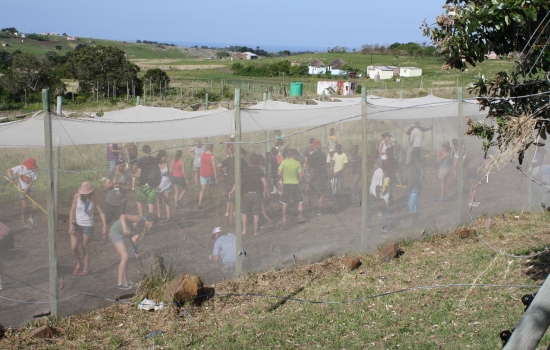Copyright © TMS Global
TMS Global
PO Box 936559
Atlanta, GA 31193-6559
800.478.8963
Our EIN number or Taxpayer Identification Number is 58-1546441.

Elliott and Katherine Stotler serve with The Mission Society in the Eastern Cape of South Africa. In one of the more impoverished areas of the country, Elliott and Katherine support a preschool, develop agricultural programs including hydroponics, and lead job skills training and micro-enterprise development programs.
In the article below, Katherine shares a recent experience in which she and Elliott facilitated nearly 200 youth who built a community garden. Hear their story, and the reconciliation efforts that they pray will come from the experience.
We received a call from a friend who runs a campground. He said a group of youth and their pastors were coming from the capital city of Pretoria during the school break for a youth retreat. The youth wanted to build a community garden and needed us to facilitate the project.
We were surprised to discover that there were 190 youth and 60 adult leaders from 10 churches involved! Our role was resourcing the work project and facilitating the local church's involvement.
We found a church in our ministry area that had an unused plot of land. The land had once been a community garden but it was now overgrown with weeds. The pastor’s wife had been hoping that the youth of their church would be able to do revive the garden, but they were too few of them. We were so thankful to be able to provide laborers!
God must have had more than growing vegetables in mind! Most of the youth were from Dutch Reformed Churches, which suggests they were of Afrikaner descent. Afrikaners are European (Dutch and other northern Europeans) settlers who came to what is now South Africa as early as the 1600's. They have a proud heritage including unique language, church, and cultural institutions. In earlier generations, Afrikaners led the formation of the Nationalist Party, which was the architect of the 20th century apartheid system which included the separation of the races and restrictions on non-whites.
So what makes this project interesting is that these youth were here in this part of the Eastern Cape Province which was formerly known as the 'Transkei.' The Transkei was one of the “black” homelands created during apartheid to separate whites and blacks, specifically the Xhosa tribe.
While that occurred well before these young people were born, in close cultures belief systems are easily carried forward from one generation to the next unless there is a clear intention to accept a new way of thinking.
Having white Afrikaner youth building a community garden alongside Xhosa youth in the former Transkei was a wonderful sight! In a country with lingering racial divides, it will take a great many 'community gardens' or similar efforts to develop a common perspective of the shared future.
The youth dug up all the weeds, tilled the soil, built raised beds, and planted close to 1,000 seedlings of spinach, beetroot, cabbage, peppers, squash, and pumpkin. Younger children from the local church painted colorful plant markers. All the youth, white and black, went home with a story to tell - an investment of time and labor and an appreciation for one another.
We asked ourselves going into this venture, How might God use this to further His work of reconciliation here? We began to see an answer to that question in the three short days together. As the plants grow to maturity, we will trust that those who participated will also grow to maturity with a new perspective of their fellow man, and their shared story in Creation. We pray that lives will be changed.